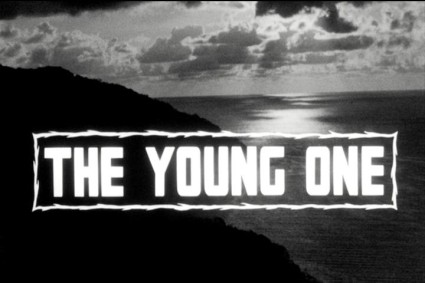

BUY IT AT AMAZON: CLICK HERE!
STUDIO: Lionsgate
MSRP: $29.98
RATED: UNRATED
RUNNING TIME: 191 Minutes
SPECIAL FEATURES:
• The Young One: Audio Commentary by Spanish and Latin Film Historians Peter Evans and Isabel Santaolalla
• Gran Casino: Audio Commentary by Film Historian Phillip Kemp
The Pitch
Fill in some gaps in a true master’s filmography.
The Humans
Jorge Negrete, Julio Villarreal, Libertad Lamarque, Bernie Hamilton, Zachary Scott
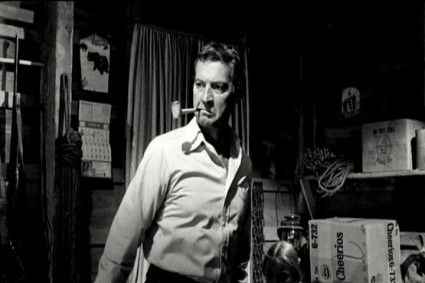
Paul liked to get into character before he ate his spinach.
The Nutshell
Gran Casino is the tale of two escaped prisoners who find work on an oil rig, only to find them implicated in a plot with the local casino owner when their boss mysteriously vanishes after a night there. Compounding things is the arrival of the boss’s sister, who then goes undercover to try and unravel the mystery of her brother’s disappearance.
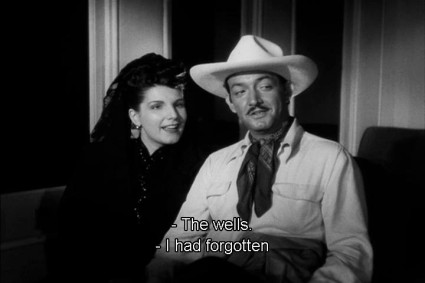
Deleted scene from F is for Fake 2: Fake Harder.
The Young One revolves around a young girl whose caretaker had just passed away. The island’s game warden has come to take charge of the young girl and instead finds himself attracted to her. However, a young African American musician sets foot on the island, on the run from allegations of rape from the mainland. What follows is a tense cat and mouse game between two men in very different places due to the color of their skin.
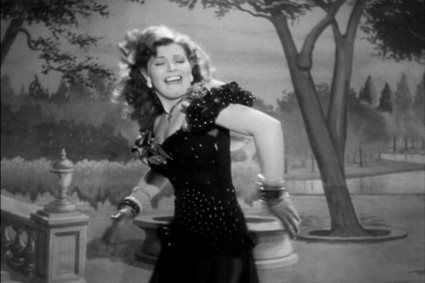
Doing the robot or alien lifeform spawning in her ass? You be the judge.
The Lowdown
Watching the minor works of a major director is equal parts excitement and tedium: it’s a bit like critical archaeology, you sift through the old decayed remains and every so often you find a whole skeleton intact that adds another piece of the puzzle to our cinematic history (an example: the elation and exhilaration I felt when first laying my eyes on Hawks’ Ball of Fire), but mostly just find little fragments here and there of what defined a filmmaker, hints and flashes of what was either earlier or later used to great effect in their masterpieces. This Bunuel collection (collecting the 1947 melodrama Gran Casino and the 1960 drama/social polemic The Young One) is a bit more like the latter; you have to dig to find the signifiers of the filmmaker who made a gigantic splash on the big screen with L’Age D’Or and Un Chien Andalou as his first pictures and then made a strong comeback late in his career with critically beloved flicks like Viridiana and The Phantom of Liberty. The films in this set mark his middle period, with Casino coming right after his cinematic exile of fifteen years and The Young One being the penultimate film before he re-hit his stride with the aforementioned late period of his career.
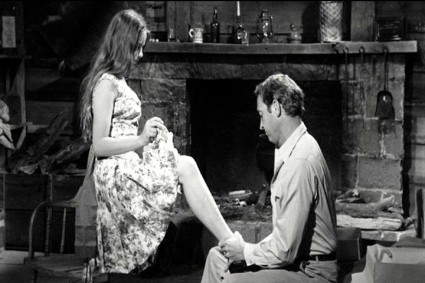
It’s a secret Peter would kill to keep: he’s a toe cleavage fucker.
Gran Casino is undoubtedly the lesser of the two, because quite frankly, it isn’t so good. It’s an overheated melodrama shot on flimsy sets where the two romantic leads never actually seem to have a romantic inclination for one another. Also, it’s the type of film where characters have to behave idiotically for the script’s inadequacies to untangle themselves and thus makes for a generally weak cinematic experience. However, there’s the anti-authoritarian vibe and the idea of ruthless big oil conglomerates at play here so Bunuel isn’t making a film completely devoid of social commentary. And to be fair, the musical numbers are when the film comes to life the strongest, and they happen every so often. Also, some choice editing near the end and the amusing reappearance of a chorus of three mustachioed men whenever the lead actor breaks out into song were some solid reminders of Bunuel’s surrealistic roots showing. However, this is strictly a film for completists and doesn’t necessitate a viewing.
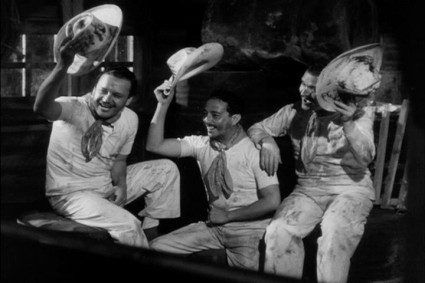
The police had finally caught on, they knew to check everywhere for Dinklage on the lam.
The Young One, however, is a pretty stimulating bit of social drama where Bunuel’s social criticism dovetails with a pretty engaging motion picture, showing that he was getting a solid handle on his art again right before his long stretch of classics at the tail end of his career. The critique of social inequality here is exemplified by the game warden’s coercion of a young girl into a sexual relationship as she physically blossoms against the wrongfully accused of rape musician who’s forced to hide due to accusations as the white man lives on unchecked. Organized religion isn’t left unchecked either, although it does get off reasonably even-handedly in this situation as a partial voice of reason, albeit a completely impotent one that holds no sway with any of the other people involved. It’s a solid drama with competent direction (some editing again harkening back to his earlier surrealist work), good acting and manages to mine undeniable tension out of its situation without spilling blood. It’s not exactly must-see, but it’s an interesting picture from a director of repute, so I’d definitely recommend checking it out.
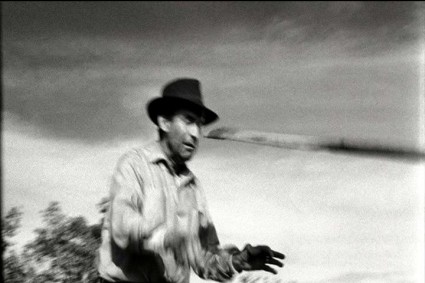
Another member added to the nation’s WOODFUCKED.
The Package
The cover art is classy and certainly knows where the focal interest in a set like this is, and that’s with Bunuel. There’s a movie on each disc, although I must note that they are mislabeled and each movie is on the disc the other film is supposed to be on. Both films look reasonably good (a few frames are dropped from Gran Casino, however) and sound decent, despite being minor works saved from purgatory since they were directed by a member of the canon. Each disc comes equipped with its own commentary. The commentary for The Young One is the weaker of the two, as it falls prey to the common issue with academic type commentaries, instead of sitting back and enjoying the picture, they feel as though every comment that’s made has to have some sort of symbolic heft or analytic value to it, meaning there’s a lot of boring talk of symbolism and a lack of enthusiasm throughout. That is countered by Kerr’s relentlessly informative and entertaining commentary on Gran Casino that puts the film in its proper social and historical context while delivering little tidbits about everything from Peter Sellers voiceover work to an inspired imitation of some immortal Treasure of the Sierra Madre dialogue. There are far too many gaps in the commentary and he stops whenever there’s a musical number (of which there’s plenty, thank you), but otherwise it’s one of the more engaging commentaries I’ve encountered recently. Overall, the films are hit or miss, but since they’re work from one of the undisputed masters of surrealist cinema, if you’re into film history they’re worth a look.
7.0 out of 10